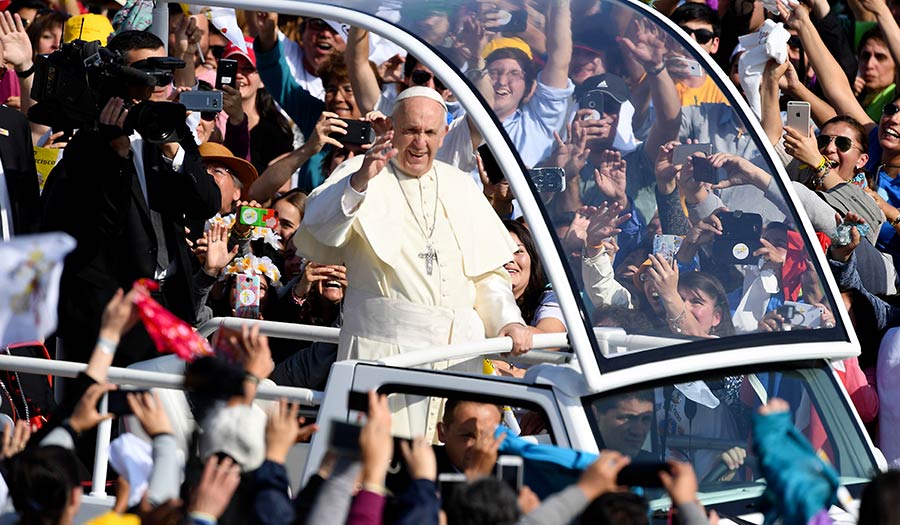 Pablo Porciuncula Brune/AFP/Getty Images
Pablo Porciuncula Brune/AFP/Getty Images
World News Desk
Learn the why behind the headlines.
Subscribe to the Real Truth for FREE news and analysis.
Subscribe NowThree churches have been firebombed in Chile on the first full day of Pope Francis’ visit to Chile. Including the latest fires, nine churches have been attacked in Chile since January 12.
While not causing any injuries, the firebombings have marked an unprecedented level of protest against history’s first Latin American pope on his home turf.
Authorities say two churches were burned in the early hours of Tuesday in the southern Araucania region. The pope is set to visit with indigenous Mapuches on Wednesday in Temuco, the capital of Araucania. The third church attacked was in Puento Alto, just south of Santiago.
In recent years, the Mapuche have burned churches to agitate for the return of ancestral lands and recognition of their language. It is not clear who has been behind the spate of recent burnings.
Francis faced controversy on another front as well: He begged for forgiveness for the “irreparable damage” done to children who were raped and molested by priests, opening his visit to Chile by diving head-first into a scandal that has greatly hurt the Catholic Church’s credibility and cast a cloud over his visit.
In Santiago, though, an estimated 400,000 jubilant Chileans turned out in droves for his first public Mass, a large gathering in the capital’s O’Higgins park where Pope John Paul II celebrated Mass three decades ago. Before the service began, Francis took a long, looping ride in his popemobile through the grounds to greet well-wishers, some of whom had camped out overnight to secure a spot.
In his first event of the day, Francis met privately with Chilean President Michelle Bachelet and addressed lawmakers, judges and other authorities at La Moneda palace. They interrupted him with applause when he said he felt “bound to express my pain and shame” that some of Chile’s pastors had sexually abused children in their care.
“I am one with my brother bishops, for it is right to ask forgiveness and make every effort to support the victims, even as we commit ourselves to ensuring that such things do not happen again,” he said.
Francis did not refer by name to Chile’s most notorious pedophile priest, the Reverend Fernando Karadima, who was sanctioned in 2011 by the Vatican to a lifetime of “penance and prayer” for sexually molesting minors. Nor did he refer to the fact that the emeritus archbishop of Santiago, a top papal adviser, has acknowledged he knew of complaints against Karadima but did not remove him from ministry.
Karadima had been a politically connected, charismatic and powerful priest who ministered to a wealthy Santiago community and produced dozens of priestly vocations and five bishops. Victims went public with their accusations in 2010, after years of complaints to church authorities.
While the scandal rocked the church, many Chileans are still furious over Francis’ subsequent decision, in 2015, to appoint a Karadima protege as bishop of the southern city of Osorno.
The Karadima scandal and a long cover-up has caused a crisis for the church in Chile, with a recent Latinbarometro survey saying the case was responsible for a significant drop in the number of Chileans who call themselves Catholic, as well as a fall in confidence in the church as an institution.
That distrust extends to Francis, who is making his first visit as pope to this country of 17 million people. The Argentine pope is nearly a native son, having studied in Chile during his Jesuit novitiate and he knows the country well, but Chileans give him the lowest approval rating among the 18 Latin American nations in the survey.
“People are leaving the church because they don’t find a protective space there,” said Juan Carlos Claret, a spokesman for a group of church members that has opposed the Karadima protege’s appointment as bishop. “The pastors are eating the flock.”
At a protest Tuesday near O’Higgins park where Francis celebrated Mass, police fired tear gas and water cannons before detaining several dozen demonstrators, according to an Associated Press photographer at the scene. Protesters carried signs with messages reading “Burn, pope!” and “We don’t care about the pope!”
Other groups, including lesbian and gay community activists, as well as members from a group called the Workers’ Socialist Front, also called for demonstrations against the pontiff.
“The role of the church has been nefarious,” said Felipe Morales, who is from the Workers’ Socialist Front. “Sex abuse cases have been covered up and people are unhappy with many other issues.”
Many are excited to see the pope. Thousands lined the streets of Santiago to get a glimpse of Francis after he arrived. O’Higgins Park was teeming with faithful attending the pope’s Mass.
“It was amazing to see him,” said Luis Salazar, a young boy who came out with his family to see Francis pass by in his popemobile.
The pope will try to inject new energy into the church during his visit, which includes sessions with migrants, members of Chile’s Mapuche indigenous group, and victims of the 1973-1990 military dictatorship. It remains to be seen if he will meet with sex abuse survivors. A meeting was not on the agenda, but such encounters never are.


